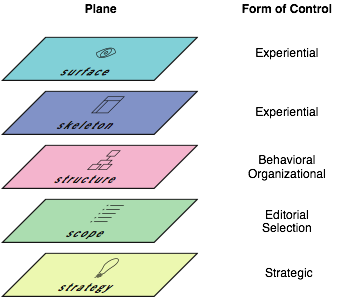June 22, 2005
Latest Essay: Create Value By Relinquishing Control
My latest essay is up on Adaptive Path's site: "How I Learned to Stop Worrying And Relinquish Control." The thesis is that the more control companies give up, the greater value they receive in return.
As I started writing that essay, I thought I'd write more of a diatribe against designers who feel that controlling the user's experience is the point of their work. While I have a dig at that perspective in the paragraph on the interactive design competition that Jeff wrote about, the essay took a decidedly different tack, trying to come to grips with the more fundamental concept of control.
The problem was, I end up using 5 or so different types of control, and I don't really call them out distinctly. This was a nagging thing in the back of my mind as I was writing the essay, and didn't really become clear to me until after I had turned it in, and talked about it with others in Adaptive Path.
I'll go example by example...
Google's relinquishes behavioral control. Instead of trying to create "stickiness" that keeps you clicking into their site, they instead try to provide the best results to your queries, wherever that might lead. I find it impressive that, if you type an address into the Google search engine, you a link not only to Google Maps, but Yahoo and Mapquest as well. You prefer the competitors? Fine! Enjoy!
Amazon and eBay have relinquished editorial control.
Whereas the designers that Jeff grew so frustrated with were unwilling to give up experiential control. Not surprisingly, this is pretty typical in the experience design and graphic design communities -- the idea that the designer knows best, and the designer needs to have total control of your experience, and you should just sit back and enjoy it.
Flickr relinquishes a combination of these forms of control. Flickr relinquishes behavior control, editorial control, and experiential control, really letting their users cobble together their own meaningful experiences.
The Long Tail is all about shifting control of selection from the business to the customer. Amazon, iTunes, and other long tail content companies simply expose databases of material, and let you have at it.
Netflix does that, but even more disruptive is their Google-like take on giving up behavioral control. Rental store late fees inflicted a cost on customers who wanted more control of their viewing experience. No more!
And then there's Craig of Craigslist, whose polling of his community for thoughts on corporate direction is some form of giving up strategic control.
While these are all different forms of control, I think there's still a foundational concept of control that underlies this. Particularly because companies typically give up control in more than one way. Google, Amazon, and eBay all have APIs. Netflix is long tail, by mail, and has no late fees. I think these companies have a core philosophical tenet that encourages relinquishing control, and that this gets expressed in many different ways.
That said, I think uncovering a framework for considering control would be valuable. To understand how these different forms of control work, how they relate, how companies and their products can figure out what forms of control make sense to relinquish. An initial thought was to use Jesse's planes...

...but I think for the framework to be successful, it would need to be specific to the idea of control.
If you're familiar with such frameworks, or have comments about my article, I encourage you to leave the comment here.
In other news, it turns out that "How I Learned To Stop Worrying And..." is a remarkably overused phrase, particularly in the digerati space (Example Other Example Google Search. ) Oh well. It worked here. And Dr. Strangelove *is* one of my all-time favorite films.
